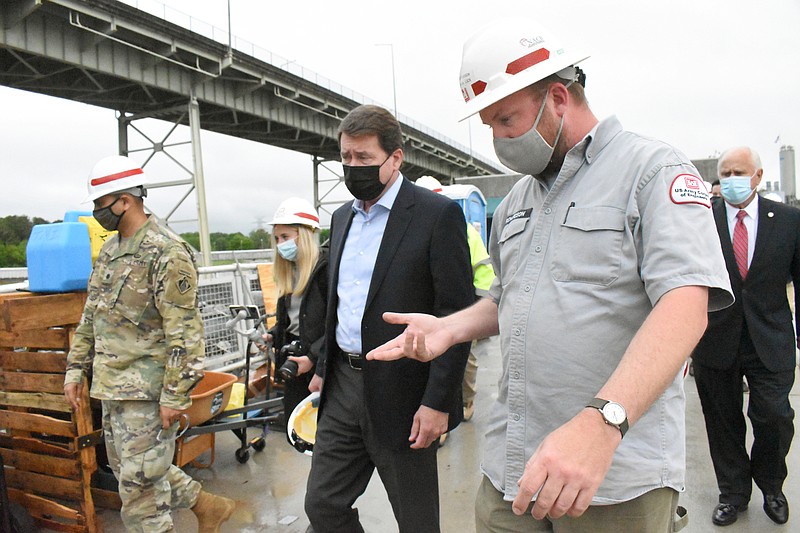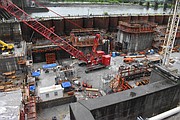A major bottleneck for barge shipments on the Tennessee River should be unlocked within the next three years as the Army Corps of Engineers works to complete the building of a new and bigger lock through the Chickamauga Dam in Chattanooga.
"We're estimating that by April 2024 we'll be able to start getting boats through the new lock and complete all of the site restoration work by 2025," Lt. Col. Sonny Avichal, the Nashville District commander for Army Corps of Engineers, said Tuesday during a briefing for U.S. Sen. Bill Hagerty, R-Tenn., at the lock construction site. "This will make our inland waterways system much more efficient and reliable."
The new lock will be able to handle up to six barges at a time compared with the existing lock that can only handle a single barge at a time through its smaller chamber. Each barge helps keep 90 trucks off the road and moves heavy freight more cost effectively and with less energy, Avichal said.
The new lock should also be in service more of the time than the existing lock that the Tennessee Valley Authority built in 1940. Because of the rock aggregate used more than 80 years ago to build the Chickamauga Dam, the existing lock suffers from concrete growth that requires frequent maintenance outages. That limits when boats are able to travel through Chattanooga.
Hagerty, a Tennessee Republican who serves on the Senate Appropriations Committee, visited the lock construction site Tuesday and praised the project as an example of the type of infrastructure investments that he hopes both Republicans and Democrats can support.
"This project will have a really important impact on our nation's transit system," Hagerty said. "Taking trucks off of our highways and shipping goods more effectively on our waterways will help with our traffic and our environment."
Hagerty said he supports more funding for roads, bridges, rail lines, waterways and broadband, but he said those types of investments collectively comprise only about 10% of the sweeping $2.3 trillion infrastructure plan proposed by President Joe Biden.
"The majority of what the president is proposing has nothing to do with hard infrastructure," Hagerty said. "It's one of those misnamed bills in Washington that is utilizing what people are interested in doing to push through other items that really have no relationship with infrastructure."
Even before Congress considers Biden's infrastructure plan, the Chickamauga Lock received a record $191 million of funding in the current fiscal year for ongoing work, up from the $101.7 million allocated to the project last year. Avichal said that should be sufficient to fund the completion of the new 110-by-600-foot lock chamber now under construction, along with the entrance walls to be built thereafter by the primary contractor for the project, Shimmick Construction Co. (formerly AECOM Energy and Construction).
Downstream at TVA's Kentucky Lock also on the Tennessee River, the Corps is spending $110.1 million this year on upgrades to the lock and dam, up from the $61.1 million allocated last year.
Although the final estimated $757 million price tag for the new Chickamauga Lock is nearly twice the original forecast, Hagerty said much of the extra costs stem from the prolonged and delayed approach in funding the project, which needs annual appropriations from Congress to be sustained.
"Regrettably this project has seen funding go up and down," Hagerty said. "Every time these projects have an extended timeline, their costs go up, and I think that reflects the budgeting challenges that we see in Washington. We need to be looking at these projects on a multi-year funding basis. What we need is more common-sense business people like myself serving in the Senate and the House that understand these dynamics."
Despite the higher costs of the lock project because of its delays in completion, Avichal said studies project an annual economic payback of $52.9 million from the project.
Contact Dave Flessner at dflessner@timesfreepress.com or 423-757-6340.

